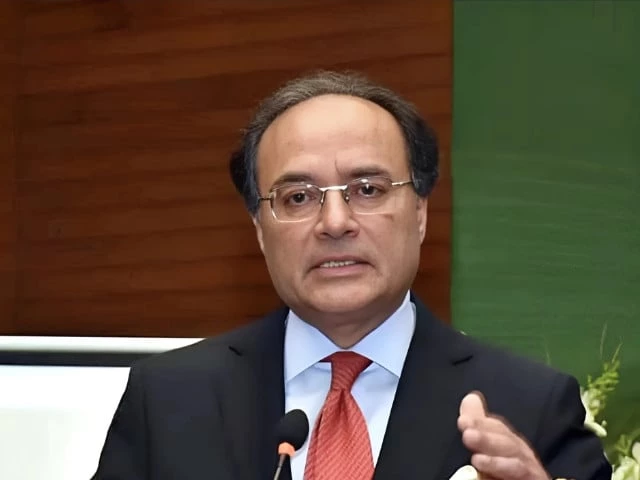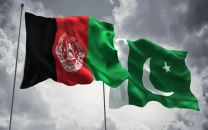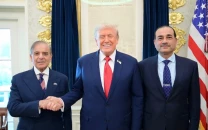FinMin rejects pressure for growth pace
Aurangzeb ruled out the possibility of "accelerating" economic growth

Days after pressure from the business community and launching of the five-year plan, Finance Minister Muhammad Aurangzeb on Monday ruled out the possibility of "accelerating" economic growth and preferred stability over debt-led growth model.
Meanwhile, the Governor State Bank of Pakistan Jameel Ahmad urged the government to expedite critical structural reforms to avoid any pressure on foreign exchange reserves and spend more on quality health and education.
Pakistan's key economic wizards – the Finance Minister and the central bank Governor – made the policy statements during a meeting of the Senate Standing Committee on Finance. They underscored their commitments to the solid and sustainable economic growth irrespective of the rate.
"Let it be clear to everyone that irrespective of how much pressure is put on me, I will not accelerate the economic growth", said Muhammad Aurangzeb.
The minister's statement came days after he held meetings with the business community in Karachi and Lahore and the launching of the five-year economic plan with the title of Uraan Pakistan. The sources said that the business community pressurized the country's key decision makers to let the economy grow.
"We will not do anything which can cause a balance of payment problem and the government remains committed to the IMF programme", said the finance minister when the PTI legislators inquired about plans announced under the Uraan Pakistan plan.
The Leader of the Opposition in the Senate Shibli Faraz had asked about the veracity of the claim made under the Uraan Pakistan plan, which the prime minister launched last week with a goal to achieve 6% annual growth rate by 2029.
"Despite 0.92% economic growth rate in the first quarter, I will not accelerate the growth", Aurangzeb clarified. He said that the only sustainable growth is the one that can be achieved by enhancing exports.
Senator Shibli Faraz inquired about any action plan to achieve 6% economic growth in the third year of the government.
The import-based GDP growth has led to a widening current account deficit in the past. Undocumented businesses, unskilled labor, limited access to credit, low technology adoption, lack of entrepreneurship support, inefficient management, and market constraints remain major obstacles to durable economic growth in Pakistan.
The Governor SBP also said that the economic growth in this fiscal year would remain in the range of 2.5% to 3.5% -a level which is below the official target. He said that the economic activity in the first quarter remained slow but it has lately started picking up.
Meanwhile, the central bank Governor urged the federal government to take measures for expediting reforms.
The labour productivity in Pakistan is one of the lowest and the spending on health and education also remains at the lowest levels, said the Governor.
"Pace of structural reforms has to be expedited otherwise there will be pressure on foreign exchange reserves that also remain at one of the lowest levels of 2.2 months equal import cover", said the Governor.
The statements made by both the co-signatories of the IMF programme underscore their commitments to the $7 billion deal.
The governor also said that the central bank also achieved the medium term inflation target of 5% to 7% but there are risks to it. He said that inflation is again expected to pick up from April to September of next year.
The high base impact will be eroded from April onwards and there will also be some volatility in prices due to upcoming gas price adjustments, said the Governor.
But he said that the average inflation will be in single digit during this fiscal year and after the first quarter of the next fiscal year, the inflation rate will again stabilize.
Jameel Ahmad said that due to monitoring tightening and reduction in global commodity prices, the pace of inflation deceleration was higher than anticipated. The annual inflation rate fell to 4.1% last month while the core inflation remained at 9.1%.
One of the reasons for low pace of inflation is the liquidity crisis in the market and the premium brands are also selling at discounted prices, said Senator Mohsin Aziz of the PTI.
The finance minister showed his concern over increasing prices of chicken, saying that the price monitoring committees should take note of it.
He said that the single-digit interest rate makes it more viable to take loans for purchasing homes and cars. The interest rate reduction has halved the companies' borrowing cost but the industry is still passing through a tough environment, said the Finance Minister.
The governor said that due to steep cuts in the interest rates, the government will save Rs1.5 trillion in debt servicing during this fiscal year. As against Rs9.8 trillion allocations in the budget, the debt servicing cost will remain less than Rs8.3 trillion, said Jameel Ahmad.
He said that because of debt servicing cost saving, the government will be able to achieve its overall budget deficit target of 6% of the GDP.
The governor said that the current account would be either positive or in deficit of up to 1% of the GDP.
He said that the current account is again expected to remain in surplus in December in a trend that is consistent with the outcomes of the current fiscal year. Jameel Ahmad said that the current account remained in surplus during this fiscal year due to higher remittances and higher exports.
The central bank expects remittances to grow over $35 billion in the current fiscal year and a main reason was shifting of grey channel remittances to the formal banking channels.
The governor said that Pakistan's imports grew last month to $5.3 billion due to higher imports of oil and some other items. But he maintained that the central bank "goal is to keep the current account deficit below 1% of the GDP and imports will be according to this level". The manageable current account deficit is below 1% of the GDP, said the Governor.
Jameel said that a key reason for the low imports was a major reduction in oil imports, which dipped to just $900 million in November. In July 2022, the oil imports were equal to $2.5 billion due to high prices and high demand.
The finance minister said that it was wrong to say that the government was controlling the external outflows. He said that he did not receive any complaint about not opening a letter of credit for import or repatriation of the dividends by foreign companies working in Pakistan.



















COMMENTS
Comments are moderated and generally will be posted if they are on-topic and not abusive.
For more information, please see our Comments FAQ